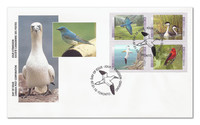| Name |
Value |
| Date of Issue |
January 10, 1997 |
| Year |
1997
|
| Quantity |
4,000,000 |
| Denomination |
45¢
|
| Perforation or Dimension |
12.5 x 13 |
| Series |
Birds of Canada
|
| Series Time Span |
1996 - 2001 |
| Printer |
Ashton-Potter Canada Limited. |
| Postal Administration |
Canada |
Use these values to track the value of your stamp collection?
prices in CAD
* Notes about these prices:
- They are not based on catalogue values but on current dealer and auction listings. The reason for this is that catalogues tend to over-value stamps.
- They are average prices. The actual value of your stamp may be slightly above or below the listed value, depending on the overall condition of your stamp. Use these prices as a guide to determine the approximate value of your stamps.
Pane of 20 Stamps
Quantity Produced -
Unknown
Official First Day Cover
Quantity Produced -
Unknown
Bird watching and stamp collecting are refined passions which, when practiced with patience and perseverance, give endless pleasure. These two great pastimes come together now in the latest edition of the series Birds of Canada. In 1996 the series began featuring images of Canadian birds with an issue of four domestic stamps (the pileated woodpecker, Atlantic puffin, ruby-throated hummingbird, and the American kestrel) and three types of postal stationery. The graceful and realistic renditions by artist Pierre Leduc were overwhelmingly popular with collectors around the world. Canada Post, therefore, takes great pleasure in announcing the 1997 issue of its Birds of Canada series. On the issue day of January 10th, stamp collectors and bird watchers will be thrilled by Pierre Leduc's newest artwork. The western grebe, mountain bluebird, northern gannet, and the scarlet tanager will be making their appearance on 45¢ stamps, and two pre-stamped envelopes will feature the western grebe and mountain bluebird. These birds have been selected with the advice of ornithologist Dr. Henri Ouellet to represent the various regions of Canada and a broad range of natural classifications. The scarlet tanager (Piranga olivacea) is classified as a songbird, yet it is not noted for the same rich arias or rhythmic twittering of its relatives. The tanager song resembles that of an American robin, although slightly hoarser. The scarlet tanager, however, does have much to sing about. Among the songbirds, they are the most migratory, and the male's plumage is a dramatic scarlet with black wings and tail. The female is a lovely olive-green colour with dark grayish-brown wings, tipped with the same green as the body. In the winter, the male dons a colour scheme to match the female. The beak of the scarlet tanager is stout and has a downcurved ridge and notch, or tooth. The birds build nests in trees 18 to 30 metres above the ground and feed on insects and some fruit. Tanagers usually lay four blue and brown spotted eggs which are incubated by the female over two week period. The males assist with the rearing of the chicks. Scarlet tanagers are small birds that prefer the deciduous woodlands in the southern regions of Ontario and Quebec, although they have been found in mixed forest and occasionally in other neighbouring provinces. The scarlet tanagers take up their winter residence in South America, from Columbia to Bolivia.
Designed by Raymond Bellemare. Based on a painting by Pierre Leduc.
Canada Post Corporation. Canada's Stamp Details, Vol. 6, No. 1, 1997, p. 5-6, 10-11.
Did you notice an error in this stamp's information?
Do you have any interesting information about this stamp that you would like to share?
Please
click here to send us an email with the details.


